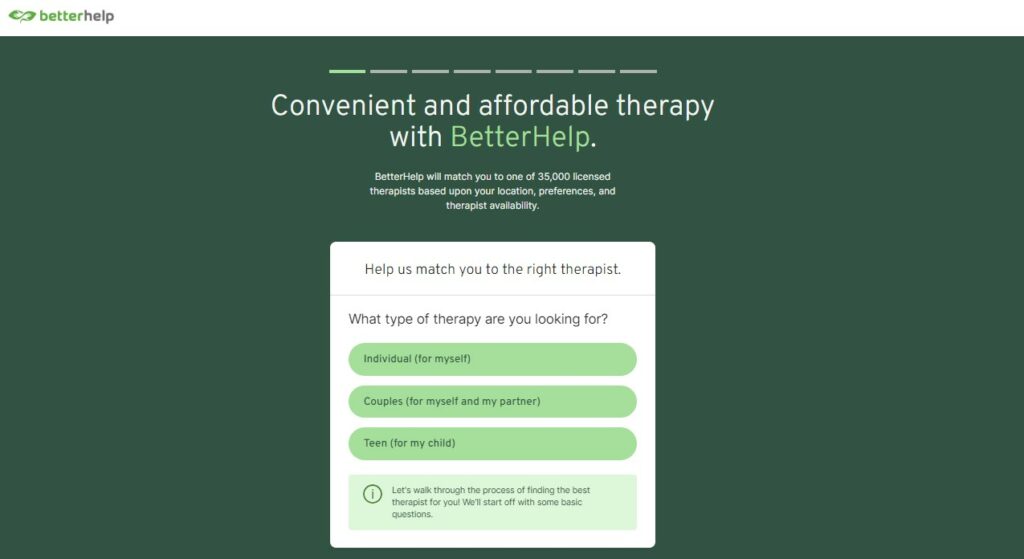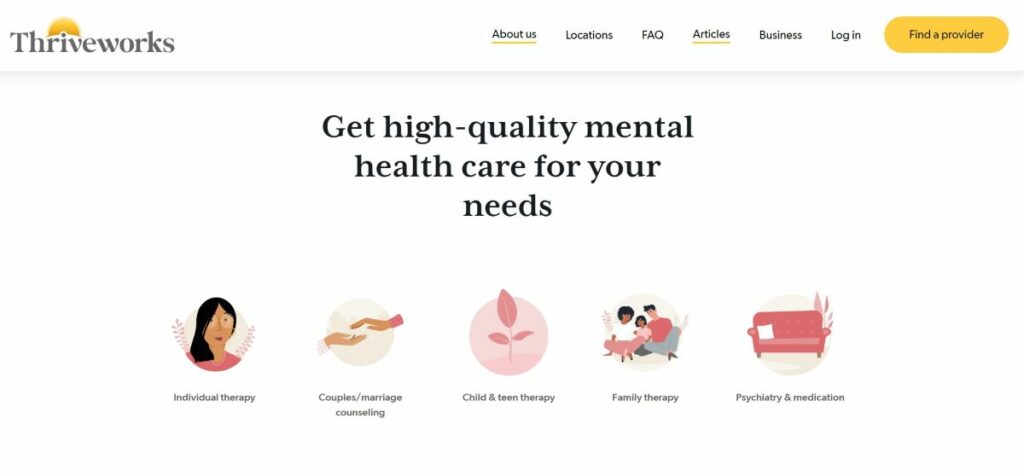No words are enough to describe the delicate relationship between a mother and her daughter. A healthy mother-daughter relationship is a powerful bond based on empathy, love, and trust.
Unfortunately, conflicts can develop in this relationship for a number of different reasons. The escalation of these disagreements may lead to serious issues, such as face-to-face confrontation and emotional disconnection.
In this guide, we’ll look at the top 5 relationship therapy services for mothers and daughters.
Want to skip right to the suggestions for mother-daughter counseling? Here is our 5 recommended therapy solution:
Mother-daughter Counseling Service
If you’re looking for accessible counseling for mothers and daughters, some services stand out. Below, we’ve explained more about the 5 best counseling services for moms and daughters to get help.
| Provider | Good For | Location | Pricing |
|---|---|---|---|
| BetterHelp | Quick match with the right therapist for you | Online therapy | $65 to $90 per week (billed every 4 weeks) |
| Find-a-therapist.com | Finding and contacting the right therapist for you | Online and in-person therapy | Varies depending on the counselor fee |
| LifeStance Health | Psychiatry, psychotherapy, couples and family therapy, child-parent relationship therapy, medication management | Online and in-person therapy in the U.S. | Varies depending on the therapist fee |
| Warrenton Women’s Counseling Center | Counseling for women, counseling for girls and teens, counseling for young adults, mother daughter counseling, relationship counseling | Online therapy in the U.S, and in-person therapy in Warrenton, VA | $130 to $225 per session |
| Thriveworks | Child therapy, online therapy, couples and marriage counseling, family therapy, individual therapy, teen counseling | Online therapy and in-person therapy in 49 states and the District of Columbia | Varies depending on your payment method, your insurance plan, your location, and additional factors |
1. BetterHelp

Explore emotional well-being with BetterHelp – your partner in affordable online therapy. With 30,000+ licensed therapists and plans starting from only $65 per week, BetterHelp makes self-care accessible to all. Complete the questionnaire to match with the right therapist.
- Good for: Quick match with the right relationship therapist for you.
- Location: Online therapy.
- Pricing: $65 to $90 per week (billed every 4 weeks).
- Features: iOS and Android app available, message your therapist anytime, live sessions are scheduled weekly and done via live chat, phone, or video call.
BetterHelp is an online therapy platform with a range of counselors who have experience mending and improving mother-daughter relationships through individual therapy. You must fill out a questionnaire, where you can provide some details about yourself and your mother/daughter, and the conflict you’re going through.
Read our BetterHelp review here.
2. Find-a-therapist.com

- Good for: Finding and contacting the right therapist for you.
- Location: Online and in-person therapy.
- Pricing: Varies depending on the counselor fee.
- Features: Filter your search, find accessible and effective online and in-person therapy, find guides on different types of therapy.
Find-a-therapist.com helps individuals connect with the right therapist for their needs. With a comprehensive directory and the possibility to customize the search, you can find a therapist with experience addressing mother-daughter relationships.
3. LifeStance Health

- Good for: Psychiatry, psychotherapy, couples and family therapy, child-parent relationship therapy, medication management.
- Location: Online and in-person therapy in the U.S.
- Pricing: Varies depending on the therapist fee.
- Features: Services for children, teens, and adults, browse a thorough profile of each therapist, locate a therapist by entering your state, condition, or required service, contact therapists directly.
LifeStance Health strives to provide tailored and evidence-based care to enhance the mother-daughter relationship through its extensive network of skilled psychiatrists, psychologists, and therapists.
4. Warrenton Women’s Counseling Center

- Good for: Counseling for women, counseling for girls and teens, counseling for young adults, mother daughter counseling, relationship counseling.
- Location: Online therapy in the U.S, and in-person therapy in Warrenton, VA.
- Pricing: $130 to $225 per session.
- Features: Choose your therapist, cognitive behavioral therapy (CBT) approach used, schedule your appointment on their website or via call.
In Warrenton Women’s Counseling Center, you will find a specialized service for women, including mother-daughter counseling. You can choose the therapist you prefer according to their profiles and make an appointment on their webpage.
5. Thriveworks

- Good for: Child therapy, online therapy, couples and marriage counseling, family therapy, individual therapy, teen counseling.
- Location: Online therapy and in-person therapy in 49 states and the District of Columbia.
- Pricing: Varies depending on your payment method, your insurance plan, your location, and additional factors.
- Features: Accepts insurance, medication management, HIPAA compliant, pick the therapist of your preference.
Thriveworks has a large network of therapists, counselors, and psychologists with the experience to manage relationship issues, including mother-daughter relationships. On this website, you can pick a therapist and schedule a session directly.
Is It Worth Using Online Mother-daughter Therapy?

Studies have shown that online counseling can be just as effective as in-person treatment for many people. If you feel that online therapy suits your needs, for example, if it will make it easier for you to get help, then it is definitely worth exploring and may be more effective than getting help in person.
However, if using an online service, you need to ensure that you’re getting counseling sessions from a licensed mental health professional. This is why it’s important to use a service with a network of licensed counselors and psychologists.
Types of Mother-daughter Relationships

Mother-daughter relationships can evolve into many different types due to differences in personalities, interests, and socio-cultural aspects.
Your relationship with your daughter or mother may fit into one or more of the following classifications.
1. Ideal and Healthy
Ideal mother-daughter relationships demonstrate trust, love, compromise, and respect.
In a healthy relationship, both the mother and daughter should exhibit the following behaviors:
- Setting practical expectations of each other.
- Accepting the mistakes and failures of one another.
- Showing care for each other even in the face of conflict.
- Sharing and listening to inner thoughts with one another.
- Spending enough time with each other (but not becoming overly attached).
- Building trust in each other.
- Creating and respecting healthy and flexible boundaries.
2. Controlling
In this type of relationship, typically a mom tries to control the relationship. Although this commonly occurs due to the mother’s protective nature, too much control can disrupt the relationship, especially if you have a young adult daughter.
A daughter might try to do everything to please her mom, while the mother doesn’t always respect the desires and freedom of her daughter. This can lead to disputes between the parent and her child.
3. Competitive
Due to repeated disagreements and unresolved conflicts, hostility can develop between a mother and daughter. This is called a competitive relationship.
Instead of love, trust, and understanding, rivalry develops. Just like men, women sometimes become overly competitive with other women in their surroundings. This practice can result in the souring of existing relationships.
4. Role Reversal
Role reversal refers to a difficult mother-daughter relationship where an adult daughter has to support her mother financially and/or emotionally. As a result, a daughter’s life is restricted due to the increased dependence of her mom on her. This type of relationship typically occurs in the latter stages of the parent’s life.
5. Estranged
When either a mother or daughter distances herself from the other, it creates a gap between them.
This sometimes happens when women’s emotional needs are not met, for instance, if a mother has divorced or married someone else. In the outcome, the daughter tries to find someone else from her own family members (or elsewhere) for emotional dependence.
Root causes of conflicts in a mother-daughter relationship

Many factors can become the root causes of conflicts between mothers and their daughters.
Some of the most common causes are:
- Neglectful behavior of either a mother or a daughter.
- Unrealistic expectations and hopes of the other.
- Controlling rather than supportive behavior.
- Jealousy.
- A mom’s attempts to live her dreams through her daughter.
- A daughter becoming overly attached to her mother.
- A disregard for the other one’s self-esteem and self-worth.
- Introversion as a response to mild conflicts, rather than sharing thoughts and feelings in an attempt to resolve the issue.
- Emotional gaps between a mother and her daughter due to external determinants, such as societal views.
Before resolving conflicts between a mother and daughter, the root causes of these issues must be uncovered. This is what professional counselors will help you with in their initial sessions.
How Can Counseling Help?
Expert-level counseling provided by licensed counselors and psychologists can help in resolving these conflicts.
Here’s how therapists help many women work through some of the issues we discussed above.
Therapists Specializing in Family Conflict
1. Assessing the Root Causes of Relationship Issues
First of all, a therapist assesses the basic cause or causes behind the conflict. They will closely investigate the relationship, and try to address the root cause, which can be related to time, emotional headspace, different expectations, family dynamics, or behavioral issues.
2. Ensure Acceptance of Responsibility
This refers to helping both people get a clearer understanding of their responsibilities in the relationship, in order to create a healthier bond.
This step is especially important because a mother and daughter are not just friends, so each typically expects more of the other than in a regular friendship. Relationship problems occur when one expects more than is reasonable from the other, or when one person does not engage with their responsibilities in the relationship.
3. Exploring Complex Mental Traumas

Trauma can lead people to internalize feelings of love, empathy, and compassion. Consequently, these feelings are not expressed as strongly as they once were.
Different patterns of mental trauma may exist in different people. A counselor helps to explore complex issues from the past and overcome these issues through psychological therapies.
4. Promoting Behavior Change
Through psychological therapy, a mental health specialist may promote behavior changes. This is used when it is found that different behavior is needed from one or more participants in order to improve the strength of the relationship.
Behavior changes occur through five different stages:
- Pre-contemplation
- Contemplation
- Preparation
- Action
- Maintenance.
5. Setting Practical Goals
A counselor will identify practical goals and checkpoints of therapy. A good therapist will promote short-term and easy-to-follow objectives, instead of impractical long-term goals. This helps to show progression towards improving the relationship.
If you’re still unsure if mother-daughter therapy is what you need, feel free to contact us, and we’ll help out.







